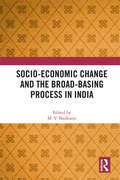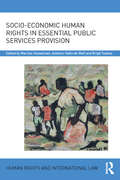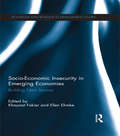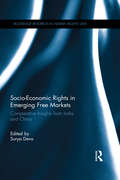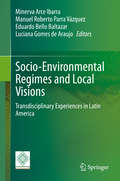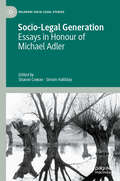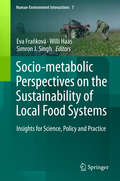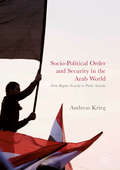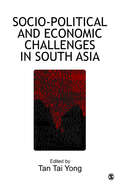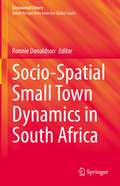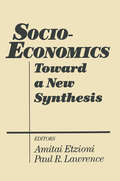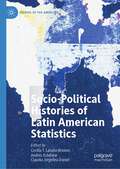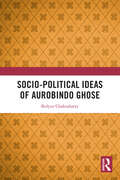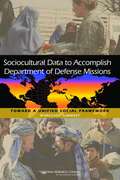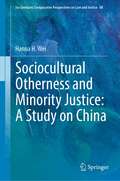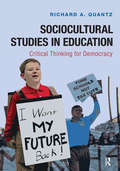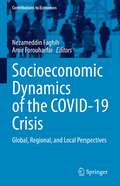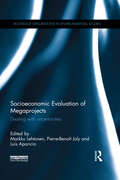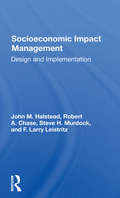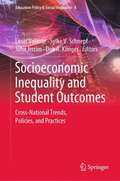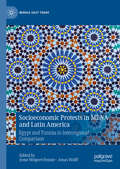- Table View
- List View
Socio-Economic Change and the Broad-Basing Process in India
by M. V. NadkarniThis book offers a new concept of inclusion of the marginalised in India — the Broad-basing Process. The author examines how through this process increasing numbers of marginalised social groups can enter into the social, political and economic mainstream and progressively derive the same advantages from society as the groups already part of it. The book critically reviews how the broad-basing process has worked in the past in India both before and after its independence. It examines how social groups like Dalits, OBCs, Muslims, women and the labour class have fared, and how far economic development, urbanisation, infrastructure development and the digital revolution have helped the marginalised and promoted broad-basing. It also offers mechanisms to speed up broad-basing in poorer economies. A first of its kind, this volume will be useful for scholars and researchers of political studies, sociology, exclusion studies, political economy and also for general readers.
Socio-Economic Human Rights in Essential Public Services Provision (Human Rights and International Law)
by Brigit Toebes Marlies Hesselman Antenor Hallo de WolfThere is a clear overlap between securing socio-economic human rights for all persons and arranging adequate access to essential public services across society. Both are necessary to realise thriving, inclusive societies, with adequate living standards for all, based on human dignity. This edited volume brings together the two topics for the first time. In particular, it identifies the common challenges for essential public services provision and socio-economic human rights realisation, and it explores how socio-economic rights law can be harnessed to reinforce better access to services. An important aim of this book is to understand how international socio-economic human rights law and guideposts can be used and strengthened to improve access to services, and assess socio-economic legal and policy decisions. The volume includes contributions from different continents, on a range of different services, and engages with the realities of different regulatory settings. After an introduction that sets out the most important challenges for universal access to services – including sufficient resources mobilisation, private actor involvement and regulation, or the need for improved checks and balances – the book goes on to discuss current issues in services provision and socio-economic rights, as well as explores the place and role of private business actors in the provision of services. In particular, it assesses how the responsibility and accountability of such actors for human rights can be improved . The final part of the book narrows in on the under-explored human rights concepts of ‘participation’ and ‘accountability’, as essential prerequisites for better ‘checks and balances’. Overall, this volume presents a unique and powerful illustration of how socio-economic human rights law supports improved access to essential public services for all.
Socio-Economic Insecurity in Emerging Economies: Building new spaces (Routledge Explorations in Development Studies)
by Khayaat Fakier Ellen EhmkeTaking a unique comparative approach to the respective development paths of India, Brazil and South Africa (IBSA), this book shows that people and governments in all three countries are faced with similar challenges of heightened insecurity, caused by liberalization and structural adjustment. The ways in which governments, as well as individuals and worker organisations in IBSA have responded to these challenges are at the core of this book. The book explores the nature of insecurity in the Global South; the nature of the responses to this insecurity on public and small-scale collective as well as individual level; the potential of these responses to be more than neo-liberal mechanisms to govern and contain the poor and lessons to be learnt from these three countries. The first section covers livelihood strategies in urban and rural areas as individual and small-scale collective response to the condition of insecurity. Insecurity in the countries of the South is characterised by a high degree of uncertainty of the availability of income opportunities. The second section looks at state responses to insecurity and contributions on social protection measures taken by the respective IBSA governments. The third section discusses whether alternative development paths can be identified. The aim is to move beyond ‘denunciatory analysis.’ Livelihood strategies as well as public policies in some of the cases allow for the building of new spaces for agency and contestation of a neo-liberal mainstream which provide emerging and experimental examples. The book develops new thinking on Northern welfare states and their declining trade unions. It argues that these concepts, knowledge and policy innovations are now travelling in three directions, from North to South, from South to North, and between Southern countries. This book provides unique insights for researchers and postgraduate students in development studies, social policy and industrial sociology.
Socio-Economic Rights in Emerging Free Markets: Comparative Insights from India and China (Routledge Research in Human Rights Law)
by Surya DevaIn the last decade or so, China and India have emerged on the global stage as two powerful free market economies. The tremendous economic growth in China and India has meant that they have been able to lift millions of people out of the poverty trap. This growth has not, however, been without problems. Apart from worrying levels of environmental pollution, a significant number of people are still struggling to live a decent life as they do not have adequate access to basic needs such as food, health services, education, water, and housing. The traditional old age support mechanism is collapsing amidst push for urbanisation and the practice of nuclear families, while the alternative social security system has not been put in place. Both China and India stress the importance of socio-economic rights, have ratified the International Covenant on Economic, Social and Cultural Rights and have in place a strong legal framework for the realisation of such rights. The constitutions of China and India accord significant importance to socio-economic rights and the both countries have numerous laws, regulations and policies that seek to implement various socio-economic rights. This book investigates how the gradual adoption of free market ideology has impacted on the realisation of socio-economic rights in both India and China and how the constitutional and legal frameworks have made necessary adjustments. Chapters in this volume, which are written by academics of international standing, explore how these two countries have tried to overcome certain common governance challenges in realising socio-economic rights. The role played by courts in India and China in the protection and realisation of socio-economic rights is considered along with the use and limitations of public interest litigation in achieving these rights. Finally, the effectiveness of measures in realising socio-economic rights are evaluated in relation to specific rights such as the rights to food, health, education, social security, and gender equality.
Socio-Economic Rights in South Africa
by Malcolm Langford Malcolm Langford Ben Cousins Jackie Dugard Tshepo Madlingozi Ben Cousins Jackie DugardThe embrace of socio-economic rights in South Africa has featured prominently in scholarship on constitution making, legal jurisprudence, and social mobilization. But the development has attracted critics who claim that this turn to rights has not generated social transformation in practice. This book sets out to assess one part of the puzzle and asks what has been the role and impact of socio-economic strategies used by civil society actors. Focusing on a range of socio-economic rights and national trends in law and political economy, the book's authors show how socio-economic rights have influenced the development of civil society discourse and action. The evidence suggests that some strategies have achieved material and political impact but this is conditional on the nature of the claim, degree of mobilization and alliance building, and underlying constraints.
Socio-Environmental Regimes and Local Visions: Transdisciplinary Experiences in Latin America
by Minerva Arce Ibarra Manuel Roberto Parra Vázquez Eduardo Bello Baltazar Luciana Gomes de AraujoThis book presents oral histories, collective dialogues, and analyses of rural and indigenous livelihoods facing global socio-environmental regime change in Latin America (LA). Since the late twentieth century, rural and indigenous producers in LA, including agriculturists, coffee-growers, as well as small-scale farmers/fishers, and others, have had to resist, cope with, or adapt to a range of neoliberal socio-environmental regimes that impact their territories and associated resources, including water, production systems and ultimately their cultural traditions. In response, rural producers are using local visions and innovation niches to decide what, when, and how to resist, cope with uncertainty, and still be successful in using their customary laws to retain their land rights and livelihoods.This book presents a range of ethnically diverse case studies from LA, which addresses socio-environmental, educational, and law regimes’ effects using transdisciplinary research approaches in rural, traditional and indigenous production systems. Based on both, the results and insights gained into how producers are resisting and adapting to these regimes, as well as decades of research carried out in LA rural territories by the participating authors, the book puts forward a baseline for devising new public policies that are better suited to the real challenges of livelihoods, poverty, and environmental degradation in LA. These recommendations are rooted in post-development thinking; they promote territorial public policy with social inclusion and a human’s rights approach. The book draws on over 20 years of research carried out by LA’s academics and their undergraduate and graduate students who have addressed collaborative work, participatory research, and transdisciplinary approaches with rural commons and communities in LA. It features 19 case studies, with contributions from Argentina, Bolivia, Brazil, Colombia, Cuba, Honduras, and Mexico.
Socio-Historical Roots of Yemen’s Collapse (Middle East Today)
by Jude KadriThe book dives into the socio-historical roots of the current ‘disintegration’ of the Yemeni state, proposing that it is the result of a long process of devaluation of the Yemeni economy through imperialistic means, in the historical era of Advanced American imperialism—starting in the 1970s—that is facing the rise of China since the 1980s. As the United States feels threatened by the blossoming of Chinese influence on the Red Sea and the strategic maritime straits of Hormuz and Bab-el-Mandeb, it is of utmost importance to understand the centrality of the war on Yemen. The disintegration of the Yemeni state since 2015, involving the disintegration of Yemeni sovereignty (in part through the fragmentation of the country), is a means of creating political chaos in a strategic country. The goal is to limit the growth of Chinese influence in the region of the Arab world, which threatens the financial superstructure of the global economic system based on the US dollar.
Socio-Legal Generation: Essays in Honour of Michael Adler (Palgrave Socio-Legal Studies)
by Simon Halliday Sharon CowanThis book honors the diverse and path-breaking work of Michael Adler, a pioneer of socio-legal scholarship in the UK. The book brings together an international group of scholars—established and emerging researchers from across the globe—to develop key ideas generated by Adler’s scholarship. Building on his rich portfolio of creative work at the interface of law and social science, the book explores themes that continue to resonate in contemporary debates about how best to understand the relationship between justice, fairness, and the modern administrative state. Specifically, the book re-examines core issues which Adler, as a key figure of the first generation of UK socio-legal scholars, explored, including: the relationship between official discretion and the rule of law; the justice of internal administrative processes; the importance of a ‘bottom up’ perspective on justice; power and accountability in the prison sector; access to justice for social welfare claimants; and the promise of viewing law through the lens of social science.
Socio-Life Science and the COVID-19 Outbreak: Public Health and Public Policy (Economics, Law, and Institutions in Asia Pacific)
by Makoto Yano Fumihiko Matsuda Anavaj Sakuntabhai Shigeru HirotaThis open access book presents the first step towards building socio-life science, a field of science investigating humans in such a way that both social and life-scientific factors are integrated. Because humans are both living and social creatures, a human action can never be understood fully without knowing both the biological traits of a person and the social scientific environments in which he exists. With this consideration, the editors of this book have initiated a research project promoting a deeper and more integrated understanding of human behavior and human health. This book aims to show what can, and could be, achieved through our interdisciplinary project. One important product is the newly formed three-party collaboration between Pasteur Institut, Kyoto University, and the Research Institute of Economy, Trade and Industry. Covering many different fields, including medicine, epidemiology, anthropology, economics, sociology, demography, geography, and policy, researchers in these institutes, and many others, present their studies on the COVID-19 pandemic. Although based on different methodologies, the studies show the importance of behavioral change and governmental policy in the fight against a huge pandemic. The book explains the unique genome cohort–panel data that the project builds to study social and life scientific aspects of humans.
Socio-Metabolic Perspectives on the Sustainability of Local Food Systems: Insights for Science, Policy and Practice (Human-Environment Interactions #7)
by Eva Fraňková Willi Haas Simron J. SinghThis book delves into diverse local food systems and critically assesses their ecological and societal benefits and trade-offs, their limits and opportunities for improving sustainability of food production, and framework conditions which either hinder or promote their development. More and more people with gradually meat heavier diets will demand growth in food production, whilst our increasingly industrialized and globalized agri-food system has already caused serious sustainability problems in the past. This calls for a change in the way we produce, distribute and consume food. A re-emerging debate on food security and food sovereignty seems to support this quest. But what are the promising alternatives to mainstream developments? Such a discussion regarding sustainability of local food systems requires a sound systemic understanding and thus invites a socio-metabolic reading of local cases by analyzing the nexus between material and energy flows as well as land and time use. This approach is needed to complement the so far mostly qualitatively-based local food studies. Applying socio-metabolic approaches to local food systems fosters a better understanding of promises and pitfalls for sustainable pathways in the future.
Socio-Political Order and Security in the Arab World
by Andreas KriegThis book examines the connection between socio-politics and security in the Arab World. In an effort to understand the social and political developments that have been on-going in the Arab World since the 1990s, culminating in the Arab Spring, Krieg moves beyond liberal deterministic assumptions - most notably that the promotion of liberal values and democracy are the panacea for the structural problems of the region. Instead, this text advances the case that grievances related to individual security needs are at the heart of regional insecurity and instability. Looking towards the future, the author asserts that regimes can only be resilient if they are able to provide for individual security inclusively. When regimes fail to cater for public security, they might be replaced by alternative non-state security providers.
Socio-Political and Economic Challenges in South Asia
by Tan Tai YongThis book is a compilation of well researched papers that examine the evolving economic, political and social landscape of South Asia. While celebrating the economic and political growth of the countries of the region, it also highlights the challenges that they are likely to face in the coming years, such as the domestic strife in Sri Lanka, Nepal, Bangladesh and Pakistan and the region′s external relations with key global players like East Asia and the United States. Socio-Political and Economic Challenges in South Asia brings together some of the best minds to provide fresh insights. On a micro-level, it engages with various issues related to South Asian countries such as the domestic policies of Nepal with respect to Maoists, caretaker governments of Bangladesh, the strategic and security implications of the July 2005 India-United States Civilian Nuclear Cooperation Agreement, etc. On a macro-level, it explores South Asia′s external relations with key global players such as East Asia and the United States, and how this in turn influences the relations among the countries of the region. The book will be of great relevance to public servants dealing with domestic issues, as well as foreign policy officials and scholars working on South Asia politics.
Socio-Spatial Small Town Dynamics in South Africa (GeoJournal Library)
by Ronnie DonaldsonThis book explores small town geographical aspects by approaching them from a socio-spatial perspective. The contributions included in this book delve into a range of topics that have not been commonly studied before, such as white privilege, neglect of municipal infrastructure, collaborative governance, livelihoods in small-scale fisheries, housing provision, well-being in mining towns, studentification in rural contexts, election trends, and the historical development of small-town spas. The book adopts a socio-spatial point of view, providing a holistic understanding of the interplay between social and spatial factors within selected small town case studies. This approach sheds light on the socio-economic, political, and cultural dynamics that shape small towns. This localized perspective allows for a more targeted analysis of issues and potential solutions, taking into account the specific historical, cultural, and political contexts of small town South Africa. The edited volume serves as a valuable resource for academics, policymakers, practitioners, and anyone interested in understanding and improving small towns in South Africa.
Socio-economics: Toward a New Synthesis (Ethical Economy Ser.)
by Amitai Etzioni Paul R. LawrenceThis work is organized in seven sections around major themes of socio-economics. The first section outlines socio-economics in an historical perspective, drawing on the "Methodenstreit" in the German school of economics at the turn of the century. Four additional essays view economic behaviour from the perspective of psychology, sociology and values outside the realm of economics. The second section of the book explores the process of choice and goals made by the variety of economic factors, among them factors that influence choices, values and motivations outside economics. The next two sections, each containing three papers, examine executive leadership and entrepreneurship from the broader socio-economic perspective. Section five includes papers that deal with the role of institutions in the modern political economy. It develops an institutional theory of markets, firms, human values in economic behaviour and investment in ethnic goals and morality. Section six focuses on the modern corporate culture considering collective human capital. The final three papers examine the boundaries that embrace the processes and activities of firms. They consider the bonds and relationships that develop between firms and organizations in the modern political economy.
Socio-political Histories of Latin American Statistics (Studies of the Americas)
by Cecilia T. Lanata-Briones Andrés Estefane Claudia Jorgelina DanielThis book brings together recent research on the sociopolitical history of Latin American statistics from the nineteenth to the first half of the twentieth century. Reflecting the influence of social constructivism in the social sciences, it sheds new light on the historical emergence and development of both statistical reasoning and practices within a region traditionally seen as a passive consumer of foreign-produced theories and methods. By analysing the processes of institutionalisation of statistics in different national spaces, from Mexico to the Southern Cone, these studies show the unique ways in which Latin America adapted and used this modern tool of government and social classification to build political regimes and scientific arenas. The early enthusiasm for enumerating reality, the regular production of statistics and censuses, and the role of the region in the global transformation of this knowledge are some of the aspects reviewed to grasp the contingent dynamic of these dialogues and appropriations. Thus, Socio-political Histories of Latin American Statistics seeks to offer new insights into the divergent regional trajectories of this discipline, advancing towards an understanding of statistics and its past from a truly global perspective.
Socio-political Ideas of Aurobindo Ghose
by Bidyut ChakrabartyBy focusing on the socio-political ideas of the nationalist Aurobindo Ghosh (1872-1950), the book is an analytical dissection of his ideational vision which is still a relatively under-studied area of nationalist thoughts. During the perod, 1893-1910, Ghosh radically altered the texture of Indian nationalism by dwelling on how nationalism flourished in different parts of India, particularly, Japan, Italy and Ireland. conceptually different from the prevalent form of nationalist voice, it was he who clearly charted out a new course for anti-British campaign that fully unfolded with the appearance of Gandhi (1869-1948) on the Indian political scene. So, Aurobindo's politico-ideological vision ushered in a new era in the nationalist battle for India's political emancipation. Not only is the book therefore an intervention in the nationalist thought, but also devised new conceptual parameters for comprehending the radicalization of politico-ideological voices while simultaneously mobilizing those who were ready to make supreme sacrifices for the cause.
Socio-political Ideas of Aurobindo Ghose
by Bidyut ChakrabartyBy focusing on the socio-political ideas of the nationalist Aurobindo Ghosh (1872-1950), the book is an analytical dissection of his ideational vision which is still a relatively under-studied area of nationalist thoughts. During the perod, 1893-1910, Ghosh radically altered the texture of Indian nationalism by dwelling on how nationalism flourished in different parts of India, particularly, Japan, Italy and Ireland. conceptually different from the prevalent form of nationalist voice, it was he who clearly charted out a new course for anti-British campaign that fully unfolded with the appearance of Gandhi (1869-1948) on the Indian political scene. So, Aurobindo's politico-ideological vision ushered in a new era in the nationalist battle for India's political emancipation. Not only is the book therefore an intervention in the nationalist thought, but also devised new conceptual parameters for comprehending the radicalization of politico-ideological voices while simultaneously mobilizing those who were ready to make supreme sacrifices for the cause.
Sociocultural Data to Accomplish Department of Defense Missions: Toward a Unified Social Framework
by National Research Council of the National AcademiesSociocultural Data to Accomplish Department of Defense Missions: Toward a Unified Social Framework summarizes presentations and discussions that took place on August 16-17, 2010, at a National Research Council public workshop sponsored by the Office of Naval Research. The workshop addressed the variables and complex interaction of social and cultural factors that influence human behavior, focusing on potential applications to the full spectrum of military operations. The workshop's keynote address by Major General Michael T. Flynn, U.S. Army, provided critical context about the cultural situation and needs of the military operating in Afghanistan. Additional presentations were divided into four panels to address the diverse missions encountered by the U.S. military worldwide. The workshop concluded with a final panel to discuss the strengths and weaknesses of different methods of acquiring and using relevant data and knowledge to accomplish these missions. The panel topics and presenters are listed below: Conflict Is Local: Mapping the Sociocultural Terrain David Kennedy, Hsinchun Chen, and Kerry Patton Bridging Sociocultural Gaps in Cooperative Relationships Robert Rubinstein, Alan Fiske, and Donal Carbaugh Building Partner Capacity with Sociocultural Awareness Jeffrey Sanchez-Burks and Shinobu Kitayama The Art of Sociocultural Persuasion Jeanne Brett, James Dillard, and Brant R. Burleson Tools, Methods, Frameworks, and Models Mark Bevir, Laura A. McNamara, Robert G. Sargent, and Jessica Glicken Turnley
Sociocultural Otherness and Minority Justice: A Study on China (Ius Gentium: Comparative Perspectives on Law and Justice #88)
by Hanna H. WeiThis book draws attention to the nonlegal, sociocultural aspects of justice for minorities in China. The primary objectives are threefold. The first is to present a tentative analysis of the lived realities of being ‘the other’ in China, with the aim of presenting a critical picture of the complex national context and identifying main concerns and key challenges. Six topics are covered - gender roles, health, class, intimacy, ethnicity and religion, and expression. The second objective is to explore the interaction between a wide range of factors and myriad systems that enable or hinder protection and justice for these groups, be they historical, political, social, or cultural, hoping to open up a rich domain of inquiry for those interested in to what extent and in what ways otherness may or may not survive in China. The third objective is to bring attention to new trends and developments, some are easily identifiable whereas others are less detectable, some are interrelated while others are relatively isolated, some are straightforward and others remain easily misinterpreted.
Sociocultural Studies in Education: Critical Thinking for Democracy
by Richard A QuantzSociocultural Studies in Education: Critical Thinking for Democracy fills a void in the education of educators and citizens in a democracy. It explores some of the fundamentals around which disagreements in education arise. It presents a process with which those new to these debates can understand often confusing and entwined sets of facts and logics. This book leads the reader through some general concepts and intellectual skills that provide the basis for making sense out of the debates around public education in a democracy. This book can be seen as a primer on how to read texts about education. It acknowledges that good teachers must be not only trained to teach, but also educated about education. It presents the various themes and currents found within the arguments and narratives that people use to represent public education. It assumes that the more those interested in education know about how to see through the rhetoric, the better they will be at discerning whose interests are served by which texts.
Socioeconomic Dynamics of the COVID-19 Crisis: Global, Regional, and Local Perspectives (Contributions to Economics)
by Nezameddin Faghih Amir ForouharfarThis book depicts and reveals the socioeconomic dynamics of the COVID-19 crisis, and its global, regional, and local perspectives. Explicitly interdisciplinary, this volume embraces a wide spectrum of topics across economics, business, public management, psychology, and public health. Written by global experts, each chapter offers a snapshot of an emerging aspect of the COVID-19 crisis for the benefit of academics and students, as well as the institutional, economic, social, and developmental policymakers and health practitioners on the ground.
Socioeconomic Evaluation of Megaprojects: Dealing with uncertainties (Routledge Explorations in Environmental Studies)
by Markku Lehtonen Pierre-Benoît Joly Luis AparicioThe governance and evaluation of ‘megaprojects’ – that is, large-scale, complex, high-stakes infrastructure projects usually commissioned by governments and delivered through partnerships between public and private organisations – is receiving increased attention. However, megaproject evaluation has hitherto largely adopted a linear-rationalist perspective to explain the frequent failure of such projects to meet the ‘iron triangle’ of performance criteria: delivering on time, within budget, and according to specifications. This approach recommends greater control and accountability to remedy megaproject ‘pathologies’. Drawing on empirical examples mainly from the transport sector and radioactive waste disposal, this book offers new perspectives to megaproject evaluation. Comprising contributions from leading experts in project evaluation and appraisal, this collection opens up new avenues by suggesting two ways of improving megaproject evaluation: 1) approaches that go beyond the dominant linearrationalist notion of policy processes, and emphasise instead the objective of opening up appraisal processes in order to enhance learning and reflexivity; and 2) approaches that extend evaluative criteria beyond the ‘iron triangle’, to cover the various socioeconomic impacts and preconditions for project success. This volume will be of great relevance to scholars and practitioners with an interest in megaprojects, energy and climate policy, radioactive waste management, urban design, and project planning and management.
Socioeconomic Impact Management: Design And Implementation
by Steve H Murdock F. Larry Leistritz John M Halstead Robert A ChaseThe authors of this book present a comprehensive analysis of impact management for such large-scale resource and industrial development projects as power plants, mines, and nuclear waste disposal facilities. An overall framework for designing an impact management program is presented and specific recommendations for implementing management measures are provided. This book is unique in that it provides a conceptual framework for choosing among alternative approaches in designing a management system, as well as offering practical guidance for implementing such systems.
Socioeconomic Inequality and Student Outcomes: Cross-National Trends, Policies, and Practices (Education Policy & Social Inequality #4)
by Louis Volante Sylke V. Schnepf John Jerrim Don A. KlingerThis book examines socioeconomic inequality and student outcomes across various Western industrialized nations and the varying success they have had in addressing achievement gaps in lower socioeconomic status student populations. It presents the national profiles of countries with notable achievement gaps within the respective school-aged student populations, explains the trajectory of achievement results in relation to both national and international large-scale assessment measures, and discusses how relevant education policies have evolved within their national contexts. Most importantly, the national profiles investigate the effectiveness of policy responses that have been adopted to close the achievement gap in lower socioeconomic status student populations. This book provides a cross-national analysis of policy approaches designed to address socioeconomic inequality.
Socioeconomic Protests in MENA and Latin America: Egypt and Tunisia in Interregional Comparison (Middle East Today)
by Irene Weipert-Fenner Jonas WolffThis edited volume presents a detailed account of the dynamics of socioeconomic contention in Egypt and Tunisia since 2011. Combining quantitative and qualitative methods, it analyses what has happened to the socioeconomic grievances that played a key role in the mass mobilizations of 2010 and 2011. The book is based on an original data set of socioeconomic protests in the two countries and on in-depth case studies that cover the two most important types of socioeconomic contention: labor protests and protests by socioeconomically disadvantaged people outside the formal economy. Drawing on a systematic review of comparative research on Latin America, the authors argue that the dynamics of socioeconomic contention in contemporary Egypt and Tunisia reflect a deep-seated crisis of popular sector incorporation. This work promises to enrich the scholarly and the political debates on Egypt and Tunisia, the MENA region and on contentious politics in times of political change.Chapter 10 of this book is available open access under a CC BY 4.0 license at link.springer.com.
